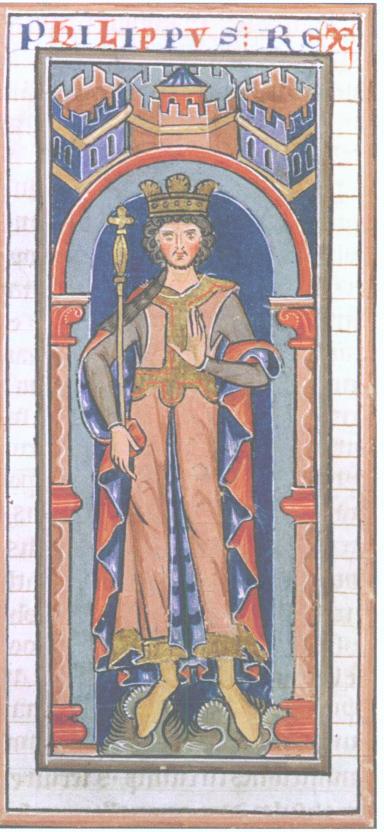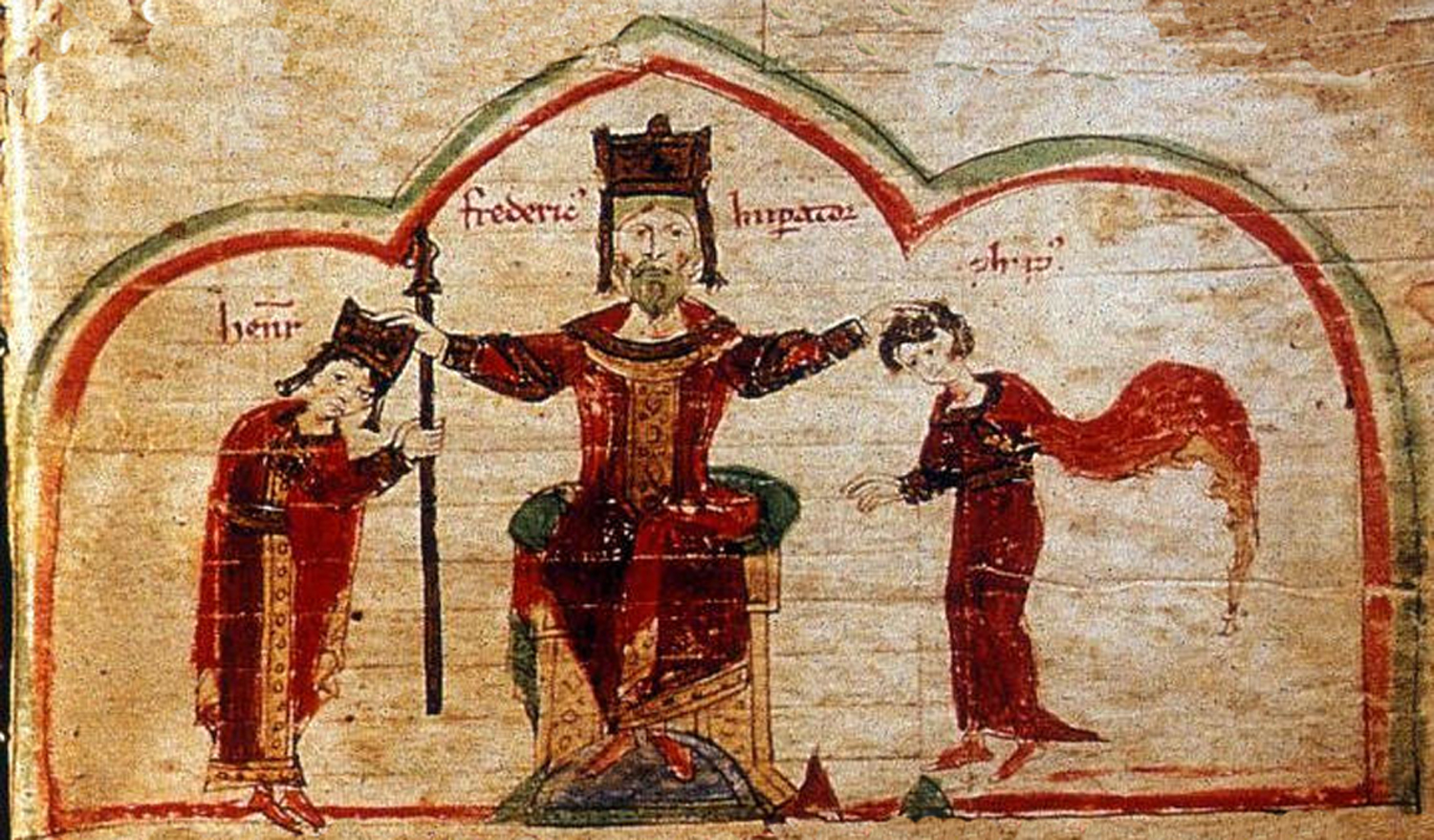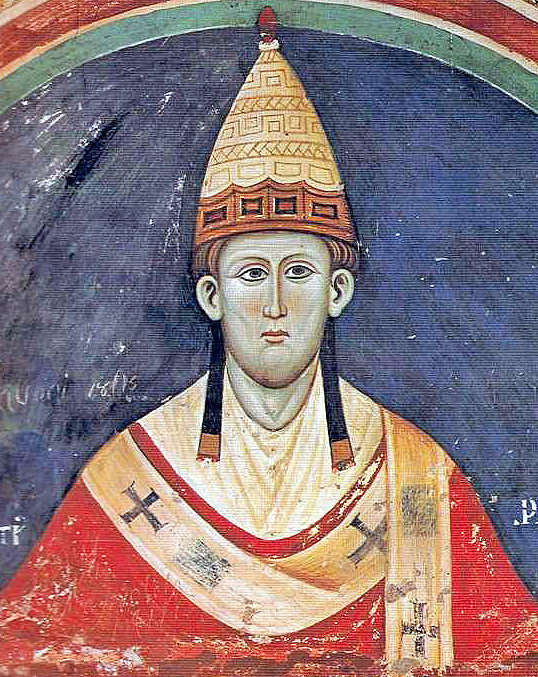|
1197
Year 1197 ( MCXCVII) was a common year starting on Wednesday (link will display the full calendar) of the Julian calendar. Events By place Europe * Spring – Emperor Henry VI travels to Italy to persuade Pope Celestine III to crown his infant son Frederick II, who has been elected "King of the Romans" at Frankfurt. * King Richard I (the Lionheart) has Château Gaillard (Normandy) built on the Seine River as he fights to restore Angevin power in northern France (approximate date). * Summer – Henry VI takes cruel measures to put down an insurrection in Sicily and southern Italy, which has been provoked by the oppression of his German officials. * September 28 – Henry VI dies of malaria at Messina (also possibly poisoned), while preparing an expedition against the Byzantine usurper Alexios III (Angelos). * Autumn – A German civil war begins upon the sudden death of Henry VI. Henry's brother, Philip of Swabia, takes over the family lands and ... [...More Info...] [...Related Items...] OR: [Wikipedia] [Google] [Baidu] |
Henry VI, Holy Roman Emperor
Henry VI (German: ''Heinrich VI.''; November 1165 – 28 September 1197), a member of the Hohenstaufen dynasty, was King of Germany ( King of the Romans) from 1169 and Holy Roman Emperor from 1191 until his death. From 1194 he was also King of Sicily. Henry was the second son of Emperor Frederick Barbarossa and Beatrice I, Countess of Burgundy. Well educated in the Latin language, as well as Roman and canon law, Henry was also a patron of poets and a skilled poet himself. In 1186 he was married to Constance of Sicily, the posthumous daughter of the Norman king Roger II of Sicily. Henry, stuck in the Hohenstaufen conflict with the House of Welf until 1194, had to enforce the inheritance claims by his wife against her nephew Count Tancred of Lecce. Henry's attempt to conquer the Kingdom of Sicily failed at the siege of Naples in 1191 due to an epidemic, with Empress Constance captured. Based on an enormous ransom for the release and submission of King Richard I of England, he ... [...More Info...] [...Related Items...] OR: [Wikipedia] [Google] [Baidu] |
Vladislaus III, Duke Of Bohemia
Vladislaus Henry ( cs, Vladislav Jindřich; – 12 August 1222), a member of the Přemyslid dynasty, was elected Duke of Bohemia (as "Vladislaus III") in 1197 and Margrave of Moravia from 1197 until his death. He only served as duke during the year 1197 and was indeed the last ruler of Bohemia to hold that title. It was his brother Ottokar I, whose forces overthrew him, who finally achieved the elevation of the Duchy of Bohemia to the status of a kingdom starting in 1198. Early life Vladislaus Henry was the second son of Duke Vladislaus II from his second marriage with Judith of Thuringia, thereby the younger brother of Ottokar I. He grew up during a frivolous time, for the complex personal relationship his father had with the emperor, Frederick Barbarossa, was leading to a tragic termination. During the late 12th century struggles within the Přemyslid dynasty, he supported his older brother Ottokar when he seized the Bohemian duchy in 1192. In turn, Ottokar appointed Vlad ... [...More Info...] [...Related Items...] OR: [Wikipedia] [Google] [Baidu] |
Brothers' Quarrel (Hungary)
The Brothers' Quarrel ( hu, testvérviszály) was a dynastic feud between Emeric, King of Hungary and his younger brother, Andrew, Duke of Slavonia, lasted from 1197 to 1203, which covered almost the entire reign of the former. The conflict had a significant impact on the development of 13th century society and political system in the Kingdom of Hungary. Background The illustrious Béla III ruled Hungary from 1172 to 1196. His first wife was Agnes of Antioch, the mother of Béla's all children. Their first child and son Emeric was born in 1174, according to genealogist Mór Wertner, which was accepted by the Hungarian historiography unanimously. Historian György Szabados argued it is possible that Agnes gave birth to her eldest son already in late 1170, still in the Byzantine Empire, where Béla (also known as Alexios in the Byzantine court) had already been there for seven years at the time of the marriage in the spring of the same year. Andrew was the second son of Béla III a ... [...More Info...] [...Related Items...] OR: [Wikipedia] [Google] [Baidu] |
Philip Of Swabia
Philip of Swabia (February/March 1177 – 21 June 1208) was a member of the House of Hohenstaufen and King of Germany from 1198 until his assassination. The death of his older brother Emperor Henry VI in 1197 meant that the Hohenstaufen rule (which reached as far as the Kingdom of Sicily) collapsed in imperial Italy and created a power vacuum to the north of the Alps. Reservations about the kingship of Henry VI's underage son, Frederick, led to two royal elections in 1198, which resulted in the German throne dispute: the two elected kings Philip of Swabia and the Welf Otto of Brunswick, claimed the throne for themselves. Both opponents tried in the following years through European and papal support, with the help of money and gifts, through demonstrative public appearances and rituals, to decide the conflict for oneself by raising ranks or by military and diplomatic measures. Philip was able to increasingly assert his kingship against Otto in the north part of the Alps. However, ... [...More Info...] [...Related Items...] OR: [Wikipedia] [Google] [Baidu] |
Andrew II Of Hungary
Andrew II ( hu, II. András, hr, Andrija II., sk, Ondrej II., uk, Андрій II; 117721 September 1235), also known as Andrew of Jerusalem, was King of Hungary and Croatia between 1205 and 1235. He ruled the Principality of Halych from 1188 until 1189/1190, and again between 1208/1209 and 1210. He was the younger son of Béla III of Hungary, who entrusted him with the administration of the newly conquered Principality of Halych in 1188. Andrew's rule was unpopular, and the boyars (or noblemen) expelled him. Béla III willed property and money to Andrew, obliging him to lead a crusade to the Holy Land. Instead, Andrew forced his elder brother, King Emeric of Hungary, to cede Croatia and Dalmatia as an appanage to him in 1197. The following year, Andrew occupied Hum. Despite the fact that Andrew did not stop conspiring against Emeric, the dying king made Andrew guardian of his son, Ladislaus III, in 1204. After the premature death of Ladislaus, Andrew ascended the throne ... [...More Info...] [...Related Items...] OR: [Wikipedia] [Google] [Baidu] |
Alexios III Angelos
Alexios III Angelos ( gkm, Ἀλέξιος Κομνηνός Ἄγγελος, Alexios Komnēnos Angelos; 1211), Latinized as Alexius III Angelus, was Byzantine Emperor from March 1195 to 17/18 July 1203. He reigned under the name Alexios Komnenos ( gkm, Ἀλέξιος Κομνηνός, Alexios Komnēnos), associating himself with the Komnenos dynasty (from which he was descended matrilineally). A member of the extended imperial family, Alexios came to the throne after deposing, blinding and imprisoning his younger brother Isaac II Angelos. The most significant event of his reign was the attack of the Fourth Crusade on Constantinople in 1203, on behalf of Alexios IV Angelos. Alexios III took over the defence of the city, which he mismanaged, and then fled the city at night with one of his three daughters. From Adrianople, and then Mosynopolis, he attempted unsuccessfully to rally his supporters, only to end up a captive of Marquis Boniface of Montferrat. He was ransomed and sen ... [...More Info...] [...Related Items...] OR: [Wikipedia] [Google] [Baidu] |
Ottokar I Of Bohemia
Ottokar I ( cs, Přemysl Otakar I.; c. 1155 – 1230) was Duke of Bohemia periodically beginning in 1192, then acquired the title of King of Bohemia, first in 1198 from Philip of Swabia, later in 1203 from Otto IV of Brunswick and in 1212 (as hereditary) from Frederick II. He was one of the most eminent members of the Přemyslid dynasty. Early years Ottokar's parents were Vladislaus II, Duke of Bohemia, and Judith of Thuringia. His early years were passed amid the anarchy that prevailed everywhere in the country. After several military struggles, he was recognized as ruler of Bohemia by Holy Roman Emperor Henry VI in 1192. He was, however, soon overthrown for joining a conspiracy of German princes to bring down the Hohenstaufen dynasty. In 1197, Ottokar forced his brother, Duke Vladislaus III Henry, to abandon Bohemia to him and to content himself with Moravia. Taking advantage of the civil war in Germany between the Hohenstaufen claimant Philip of Swabia and the Welf cand ... [...More Info...] [...Related Items...] OR: [Wikipedia] [Google] [Baidu] |
Frederick II, Holy Roman Emperor
Frederick II (German language, German: ''Friedrich''; Italian language, Italian: ''Federico''; Latin: ''Federicus''; 26 December 1194 – 13 December 1250) was King of Sicily from 1198, King of Germany from 1212, King of Italy and Holy Roman Emperor from 1220 and King of Jerusalem from 1225. He was the son of emperor Henry VI, Holy Roman Emperor, Henry VI of the House of Hohenstaufen, Hohenstaufen dynasty and Queen Constance, Queen of Sicily, Constance of Sicily of the Hauteville family, Hauteville dynasty. His political and cultural ambitions were enormous as he ruled a vast area, beginning with Sicily and stretching through Italy all the way north to Germany. As the Crusades progressed, he acquired control of Jerusalem and styled himself its king. However, the Papacy became his enemy, and it eventually prevailed. Viewing himself as a direct successor to the Roman emperors of antiquity, he was Holy Roman Emperor, Emperor of the Romans from his papal coronation in 1220 until hi ... [...More Info...] [...Related Items...] OR: [Wikipedia] [Google] [Baidu] |
Richard I Of England
Richard I (8 September 1157 – 6 April 1199) was King of England from 1189 until his death in 1199. He also ruled as Duke of Normandy, Aquitaine and Gascony, Lord of Cyprus, and Count of Poitiers, Anjou, Maine, and Nantes, and was overlord of Brittany at various times during the same period. He was the third of five sons of King Henry II of England and Eleanor of Aquitaine and seemed unlikely to become king, but all his brothers except the youngest, John, predeceased their father. Richard is known as Richard Cœur de Lion ( Norman French: ''Le quor de lion'') or Richard the Lionheart because of his reputation as a great military leader and warrior. The troubadour Bertran de Born also called him Richard Oc-e-Non (Occitan for ''Yes and No''), possibly from a reputation for terseness. By the age of 16, Richard had taken command of his own army, putting down rebellions in Poitou against his father. Richard was an important Christian commander during the Third Crusade, ... [...More Info...] [...Related Items...] OR: [Wikipedia] [Google] [Baidu] |
German Throne Dispute
The German throne dispute or German throne controversy (german: Deutscher Thronstreit) was a political conflict in the Holy Roman Empire from 1198 to 1215. This dispute between the House of Hohenstaufen and House of Welf was over the successor to Emperor Henry VI who had just died. After a conflict lasting 17 years the Hohenstaufen Frederick II prevailed. Origin On 28 September 1197, Emperor Henry VI, who was just 32 years old, died unexpectedly creating unrest in the circles of the princes about the future direction of the Empire. There were now opposing forces to the hitherto stable position of the Hohenstaufens, as had already been demonstrated by the failure of the Henry VI's '' Erbreichsplan'' or "plan for hereditary succession". The princes were now faced with the question as to whether they would recognize Henry's son, Frederick II, now only three years old, as successor. Although Frederick had already been elected at the end of 1196 in Frankfurt under the heavy influe ... [...More Info...] [...Related Items...] OR: [Wikipedia] [Google] [Baidu] |
Duchy Of Bohemia
The Duchy of Bohemia, also later referred to in English as the Czech Duchy, ( cs, České knížectví) was a monarchy and a principality of the Holy Roman Empire in Central Europe during the Early and High Middle Ages. It was formed around 870 by Czechs as part of the Great Moravian realm. Bohemia separated from disintegrating Moravia after Duke Spytihněv swore fealty to the East Frankish king Arnulf in 895. While the Bohemian dukes of the Přemyslid dynasty, at first ruling at Prague Castle and Levý Hradec, brought further estates under their control, the Christianization initiated by Saints Cyril and Methodius was continued by the Frankish bishops of Regensburg and Passau. In 973, the Diocese of Prague was founded through the joint efforts of Duke Boleslaus II and Emperor Otto I. Late Duke Wenceslaus I of Bohemia, killed by his younger brother Boleslaus in 935, became the land's patron saint. While the lands were occupied by the Polish king Bolesław I and internal stru ... [...More Info...] [...Related Items...] OR: [Wikipedia] [Google] [Baidu] |
Kingdom Of Sicily
The Kingdom of Sicily ( la, Regnum Siciliae; it, Regno di Sicilia; scn, Regnu di Sicilia) was a state that existed in the south of the Italian Peninsula and for a time the region of Ifriqiya from its founding by Roger II of Sicily in 1130 until 1816. It was a successor state of the County of Sicily, which had been founded in 1071 during the Norman conquest of the southern peninsula. The island was divided into three regions: Val di Mazara, Val Demone and Val di Noto. In 1282, a revolt against Angevin rule, known as the Sicilian Vespers, threw off Charles of Anjou's rule of the island of Sicily. The Angevins managed to maintain control in the mainland part of the kingdom, which became a separate entity also styled ''Kingdom of Sicily'', although it is commonly referred to as the Kingdom of Naples, after its capital. From 1282 to 1409 the island was ruled by the Spanish Crown of Aragon as an independent kingdom, then it was added permanently to the Crown. After 1302, the isl ... [...More Info...] [...Related Items...] OR: [Wikipedia] [Google] [Baidu] |







